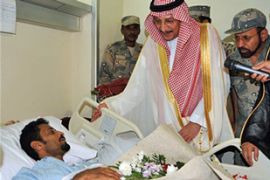Heavy clashes at Saudi-Yemen border
Saudi commanders say troops are shelling suspected Houthi positions.

Mohammed Abdel-Salam, a spokesman for the Houthis, told Al Jazeera that the men were seized after Saudi ground forces crossed into Yemeni territory.
If such a ground incursion were proved true, it would indicate a deepening involvement by Saudi Arabia in a battle that is being viewed as a proxy conflict with regional power Iran.
Abdel-Salam said the captured soldiers would be interviewed. “They will be treated with respect,” he added.
He also urged Riyadh to end the “unjust Saudi aggression” and to stop Yemeni forces from using bases inside Saudi territory to attack the Houthis.
Saudi Arabia has not commented on the claim, but has previously said that its operations against the Yemeni fighters have been limited to air raids and artillery strikes.
Saudi support
Khalid al-Dakhil, a political analyst at the King Saud University, said that it is impossible for Saudi Arabia to ignore the conflict between the Houthis and the Yemeni government.
| In depth | |||||||||
|
“The Houthis seem to be very determined in pinning down the Yemeni army and the Saudi government cannot afford to just sit by and watch what is happening. They have to support the Yemeni government”, he told Al Jazeera.
“The co-operation between Yemen and Saudi Arabia runs for a long time now, even before the Houthis.
“I don’t think the Houthis have any chance of succeeding in the end. They will be isolated, they will be squeezed between two armies and I think eventually they will run out of any luck.”
The Yemeni government accuses the Houthis of seeking to restore an imamate overthrown in a 1962 coup that sparked eight years of civil war.
The Houthis insist they are fighting to defend their community against government aggression and marginalisation.
Focused on infiltrators
The Saudi Press Agency reported on Friday that the kingdom’s attacks were “focused on infiltrators in Jebel al-Dukhan and other targets within the range of operations within Saudi territory”.
“The entry of the gunmen to Saudi territory, the aggression against border patrols … and presence on Saudi soil is a violation of sovereignty that gives the kingdom every right to take all measures to end this illegitimate presence,” it said, citing an official source.
 |
| The Yemeni army launched an offensive against the Houthis in August [EPA] |
Saudi government officials said on Thursday that at least 40 Houthi fighters had been killed as Saudi forces recaptured an area close to the border which had been seized by the Yemeni group.
At least one member of the Saudi security forces was killed and 11 others injured as the Houthis crossed the border.
A government adviser in Riyadh told the AFP news agency on Thursday that there had also been air raids in Yemen, but the government in Sanaa denied that Saudi fighter jets had crossed in its territory.
Saudi Arabia, which the Houthis accuse of providing support to Yemen’s military, has become increasingly concerned about the violence along its southern border since it flared up in August.
There have been claims that Iran, the predominantly Shia rival of Saudi Arabia for power in the region, has been providing assistance to the Houthis.
Sanaa said on October 28 that it had arrested five Iranians on a boat loaded with weapons allegedly destined for the Houthis.
But the group denies receiving any help from Tehran, which has offered to mediate in the conflict.
Houthi denial
Abdul-Malik al-Houthi, the Houthis’ leader, told Al Jazeera that there was no way for Iran to get weapons to his men in the far north of Yemen. “Weapons are largely available in Yemen,” he said.
He said his fighters had also seized arms from the Yemeni army, including those taken from captured security posts.
Al-Houthi said his group had no ambitions to target territory in Saudi Arabia. “Saudi Arabia has always co-operated with Yemen, but this co-operation has now taken a new shape,” he said.
Hundreds of people have died in northern Yemen since the country’s army began its offensive against the Houthis on August 11.
The fighters, concentrated mainly in the Saada and Amran provinces, are known as Houthis after their late leader, Abdul-Malik’s brother Hussein Badr Eddin al-Houthi, a Zaidi leader who was killed by the Yemeni army in September 2004.
An offshoot of Shia Islam, the Zaidis are a minority in a predominantly Sunni Arabian peninsula but form the majority in northern Yemen. Only a small minority of Zaidis are involved in the Houthi uprising.
